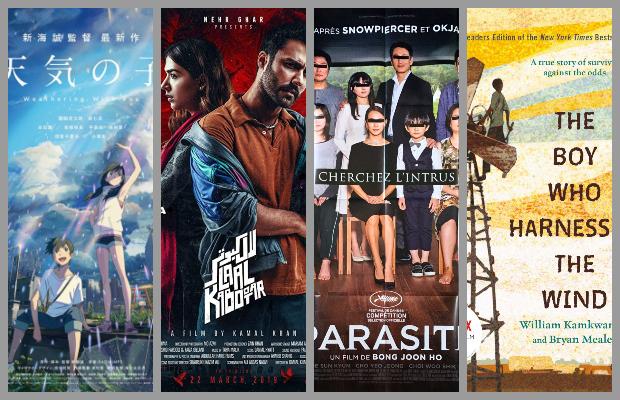Oscars 2020: This time record 93 countries have submitted entries for Best International Feature Film category

This time it’s a record-breaking total of 93 countries that have submitted their entries to be considered for best international film nominations at the Academy Awards. The previous high number for the international submissions was 92 back in 2017.
For this year’s Oscars, a total of 87 films were submitted last year. And the Mexican entry by Alfonso Cuaron’s “Roma” won the category this year, becoming the first-ever Mexican entry to win the award in this category.
On Monday, the Academy has announced the full list of eligible films and countries for 2020 Oscars. A few countries including Ghana, Nigeria, and Uzbekistan will be competing for the first time in the category, it has been previously known as the best foreign-language film category.
Nominations for the 92nd Oscars will be announced on 13 January 2010, while the Oscars will be presented on February 9. A total of 10 films will be shortlisted from the submitted entries, which will be announced on December 16.
Film Laal Kabootar is Pakistan’s official entry in the best international category will be facing fierce competition, as there are many high-profile, critically acclaimed films competing for being nominated.
To name a few, this year’s submission includes South Korea’s “Parasite,” Bong Joon Ho’s black comedy which won the Palme d’Or at the Cannes Film Festival; France’s “Les Miserables”; the UK’s “The Boy Who Harnessed the Wind,” from Chiwetel Ejiofor; and Norway’s “Out Stealing Horses,” starring Stellan Skarsgard.
Furthermore, Spain’s “Pain and Glory” from Pedro Almodovar with Antonio Banderas starring as a film director; Japan’s “Weathering With You,” the country’s first animated entry since “Princess Mononoke”; Senegal’s “Atlantics” from director Mati Diop, winner of the Grand Prix at Cannes.
Here is the complete list of all the international 2019 submissions, listed in alphabetical order:
Albania, “The Delegation,” Bujar Alimani, director;
Algeria, “Papicha,” Mounia Meddour, director;
Argentina, “Heroic Losers,” Sebastián Borensztein, director;
Armenia, “Lengthy Night,” Edgar Baghdasaryan, director;
Australia, “Buoyancy,” Rodd Rathjen, director;
Austria, “Joy,” Sudabeh Mortezai, director;
Bangladesh, “Alpha,” Nasiruddin Yousuff, director;
Belarus, “Debut,” Anastasiya Miroshnichenko, director;
Belgium, “Our Mothers,” César Díaz, director;
Bolivia, “I Miss You,” Rodrigo Bellott, director;
Bosnia and Herzegovina, “The Son,” Ines Tanovic, director;
Brazil, “Invisible Life,” Karim Aïnouz, director;
Bulgaria, “Ága,” Milko Lazarov, director;
Cambodia, “In the Life of Music,” Caylee So, Sok Visal, directors;
Canada, “Antigone,” Sophie Deraspe, director;
Chile, “Spider,” Andrés Wood, director;
China, “Ne Zha,” Yu Yang, director;
Colombia, “Monos,” Alejandro Landes, director;
Costa Rica, “The Awakening of the Ants,” Antonella Sudasassi Furniss, director;
Croatia, “Mali,” Antonio Nuic, director;
Cuba, “A Translator,” Rodrigo Barriuso, Sebastián Barriuso, directors;
Czech Republic, “The Painted Bird,” Václav Marhoul, director;
Denmark, “Queen of Hearts,” May el-Toukhy, director;
Dominican Republic, “The Projectionist,” José María Cabral, director;
Ecuador, “The Longest Night,” Gabriela Calvache, director;
Egypt, “Poisonous Roses,” Ahmed Fawzi Saleh, director;
Estonia, “Truth and Justice,” Tanel Toom, director;
Ethiopia, “Running against the Wind,” Jan Philipp Weyl, director;
Finland, “Stupid Young Heart,” Selma Vilhunen, director;
France, “Les Misérables,” Ladj Ly, director;
Georgia, “Shindisi,” Dimitri Tsintsadze, director;
Germany, “System Crasher,” Nora Fingscheidt, director;
Ghana, “Azali,” Kwabena Gyansah, director;
Greece, “When Tomatoes Met Wagner,” Marianna Economou, director;
Honduras, “Blood, Passion, and Coffee,” Carlos Membreño, director;
Hong Kong, “The White Storm 2 Drug Lords,” Herman Yau, director;
Hungary, “Those Who Remained,” Barnabás Tóth, director;
Iceland, “A White, White Day,” Hlynur Pálmason, director;
India, “Gully Boy,” Zoya Akhtar, director;
Indonesia, “Memories of My Body,” Garin Nugroho, director;
Iran, “Finding Farideh,” Azadeh Moussavi, Kourosh Ataee, directors;
Ireland, “Gaza,” Garry Keane, Andrew McConnell, directors;
Israel, “Incitement,” Yaron Zilberman, director;
Italy, “The Traitor,” Marco Bellocchio, director;
Japan, “Weathering with You,” Makoto Shinkai, director;
Kazakhstan, “Kazakh Khanate. The Golden Throne,” Rustem Abdrashov, director;
Kenya, “Subira,” Ravneet Singh (Sippy) Chadha, director;
Kosovo, “Zana,” Antoneta Kastrati, director;
Kyrgyzstan, “Aurora,” Bekzat Pirmatov, director;
Latvia, “The Mover,” Davis Simanis, director;
Lebanon, “1982,” Oualid Mouaness, director;
Lithuania, “Bridges of Time,” Audrius Stonys, Kristine Briede, directors;
Luxembourg, “Tel Aviv on Fire,” Sameh Zoabi, director;
Malaysia, “M for Malaysia,” Dian Lee, Ineza Roussille, directors;
Mexico, “The Chambermaid,” Lila Avilés, director;
Mongolia, “The Steed,” Erdenebileg Ganbold, director;
Montenegro, “Neverending Past,” Andro Martinović, director;
Morocco, “Adam,” Maryam Touzani, director;
Nepal, “Bulbul,” Binod Paudel, director;
Netherlands, “Instinct,” Halina Reijn, director;
Nigeria, “Lionheart,” Genevieve Nnaji, director;
North Macedonia, “Honeyland,” Ljubo Stefanov, Tamara Kotevska, directors;
Norway, “Out Stealing Horses,” Hans Petter Moland, director;
Pakistan, “Laal Kabootar,” Kamal Khan, director;
Palestine, “It Must Be Heaven,” Elia Suleiman, director;
Panama, “Everybody Changes,” Arturo Montenegro, director;
Peru, “Retablo,” Alvaro Delgado Aparicio, director;
Philippines, “Verdict,” Raymund Ribay Gutierrez, director;
Poland, “Corpus Christi,” Jan Komasa, director;
Portugal, “The Domain,” Tiago Guedes, director;
Romania, “The Whistlers,” Corneliu Porumboiu, director;
Russia, “Beanpole,” Kantemir Balagov, director;
Saudi Arabia, “The Perfect Candidate,” Haifaa Al Mansour, director;
Senegal, “Atlantics,” Mati Diop, director;
Serbia, “King Petar the First,” Petar Ristovski, director;
Singapore, “A Land Imagined,” Yeo Siew Hua, director;
Slovakia, “Let There Be Light,” Marko Skop, director;
Slovenia, “History of Love,” Sonja Prosenc, director;
South Africa, “Knuckle City,” Jahmil X.T. Qubeka, director;
South Korea, “Parasite,” Bong Joon Ho, director;
Spain, “Pain and Glory,” Pedro Almodóvar, director;
Sweden, “And Then We Danced,” Levan Akin, director;
Switzerland, “Wolkenbruch’s Wondrous Journey into the Arms of a Shiksa,” Michael Steiner, director;
Taiwan, “Dear Ex,” Mag Hsu, Chih-Yen Hsu, directors;
Thailand, “Krasue: Inhuman Kiss,” Sitisiri Mongkolsiri, director;
Tunisia, “Dear Son,” Mohamed Ben Attia, director;
Turkey, “Commitment Asli,” Semih Kaplanoglu, director;
Ukraine, “Homeward,” Nariman Aliev, director;
United Kingdom, “The Boy Who Harnessed the Wind,” Chiwetel Ejiofor, director;
Uruguay, “The Moneychanger,” Federico Veiroj, director;
Uzbekistan, “Hot Bread,” Umid Khamdamov, director;
Venezuela, “Being Impossible,” Patricia Ortega, director;
Vietnam, “Furie,” Le Van Kiet, director.






